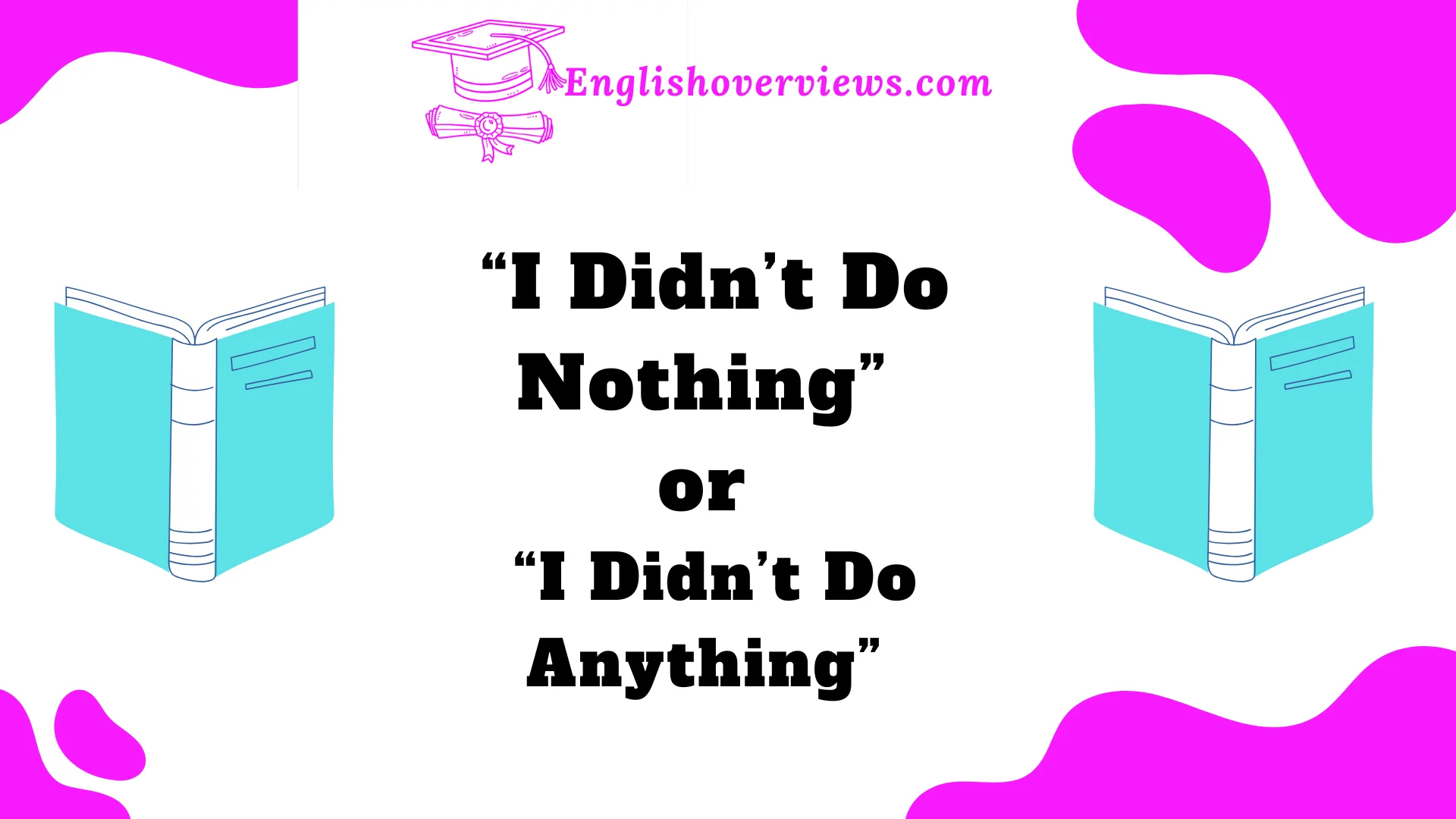When it comes to English grammar, a common point of confusion is negation, especially double negatives. Have you ever heard someone say, “I didn’t do nothing”? While it may seem harmless, this phrase breaks the rules of standard grammar.
On the other hand, “I didn’t do anything” is both grammatically correct and widely accepted in formal contexts. Understanding the difference between these phrases isn’t just about following the rules—it’s about ensuring clarity and avoiding misunderstandings.
In this article, we’ll explore the grammar of negation, the role of double negatives, and how phrases like “I didn’t do nothing” originated.
You’ll also learn why formal English prefers certain structures over others and how to use negatives correctly in different settings. Whether you’re writing a professional email or having a casual conversation, mastering this skill is essential.
Introduction to Double Negatives in English
A double negative occurs when two negative elements are used in the same sentence. While this might sound straightforward, it’s a complex topic with roots in both historical linguistics and modern dialects.
What Are Double Negatives?
In English, negatives include words like:
- No
- Not
- Never
- Nobody
- Nothing
When two of these words are combined in one sentence, they can either cancel each other out (as in logic) or create emphasis, depending on the context and language rules.
Historical Perspective
Did you know that Old English often used double negatives for emphasis? Shakespeare’s works, for instance, contain many examples of double negatives. However, modern standard English evolved to treat double negatives as incorrect because they can create ambiguity.
Why Do People Use Double Negatives?
- Regional dialects: In some regions, like the Southern United States or Cockney English, double negatives are common in everyday speech.
- Cultural expressions: Double negatives often appear in music, movies, and casual conversations.
- Emphasis: People sometimes use double negatives to stress their point, even if it’s not grammatically correct.
Common Examples
| Phrase | Meaning |
| “I didn’t do nothing.” | I did something. (Double negative issue) |
| “I didn’t do anything.” | I did nothing. (Grammatically correct) |
| “I ain’t got no time.” | I have no time. (Double negative issue) |
Key takeaway: Double negatives in English are often misunderstood, but their usage depends heavily on context and intent.
Exploring the Grammatical Structure of Negation
To understand why “I didn’t do nothing” is incorrect, let’s break down negation in English grammar.
The Basics of Negation
Negation is the process of making a sentence negative. This typically involves:
- Adding not or a contraction like n’t to the verb.
- Using negative pronouns or adverbs like nobody, never, nothing.
Examples:
- Positive: I did something.
- Negative: I didn’t do anything.
Standard vs. Non-Standard Negation
In standard English, one negative word is sufficient. Adding a second negative creates confusion. Non-standard English, however, might use multiple negatives for emphasis, as in “I didn’t do nothing.”
Sentence Structure Breakdown
| Component | Grammatically Correct | Non-Standard |
| Verb + Negation | I didn’t go. | I didn’t not go. |
| Negative Pronoun | I didn’t see anyone. | I didn’t see nobody. |
Pro Tip: Stick to a single negative in formal writing for better clarity and acceptance.
The Role of ‘Not’ in Negative Sentences
The word ‘not’ is a cornerstone of negative sentences in English. It’s simple yet powerful.
Function of ‘Not’
- Turns affirmative sentences into negatives.
- Works alongside auxiliary verbs (e.g., is, do, have).
Examples:
- Affirmative: She is going.
- Negative: She is not going.
Common Pitfalls with ‘Not’
People often misuse ‘not’, especially in casual speech. For instance:
- Incorrect: She didn’t go nowhere.
- Correct: She didn’t go anywhere.
Quick Tip:
Always pair ‘not’ with its proper counterpart to avoid double negatives.
The Meaning and Usage of ‘Anything’ in Negatives
Words like ‘anything’ and ‘nothing’ play a crucial role in negative sentences. Understanding their nuances can prevent grammatical mistakes.
The Difference Between ‘Anything’ and ‘Nothing’
| Word | Function | Example |
| Anything | Used with negatives and questions | I didn’t see anything. |
| Nothing | Used to mean the absence of something | I saw nothing. |
Key Rule:
When using ‘not’, pair it with ‘anything.’ Pairing it with ‘nothing’ creates a double negative.
Real-World Example
- Incorrect: The employee didn’t complete nothing in time.
- Correct: The employee didn’t complete anything in time.
When Slang Meets Standard English: Analyzing “I Didn’t Do Nothing”
Slang often bends grammatical rules, and “I didn’t do nothing” is no exception.
Slang in Everyday Use
This phrase is frequently used in:
- Music lyrics: “I didn’t do nothing wrong” is a common line in songs.
- Pop culture: Characters in movies and TV shows often use double negatives for authenticity.
Cultural Perspective
While slang has its place in casual communication, it’s not suitable for formal contexts. Using phrases like “I didn’t do nothing” can undermine your credibility.
FAQs About Double Negatives
What is a double negative?
A double negative occurs when two negative elements are used in the same sentence, often canceling each other out.
Is “I didn’t do nothing” correct?
No, it’s grammatically incorrect in standard English. The correct phrase is “I didn’t do anything.”
Why do people use double negatives?
Double negatives are common in certain dialects and slang. They can add emphasis or reflect cultural speech patterns.
Can I use double negatives in formal writing?
It’s best to avoid double negatives in formal writing to maintain clarity and professionalism.
How can I avoid double negatives?
Focus on using a single negative word in each sentence. For example, use “I didn’t go anywhere” instead of “I didn’t go nowhere.”

Alyan Ashraf is the creative mind behind English Overviews, a platform dedicated to helping learners master the English language. Passionate about education and language development, Alyan specializes in simplifying complex English concepts, making learning accessible for students of all levels.











